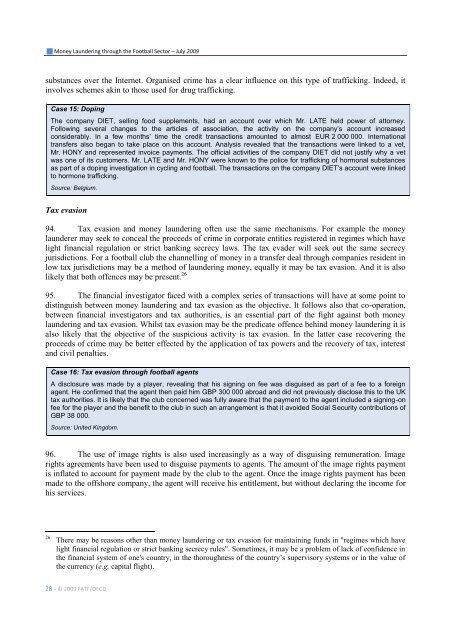Money Laundering through the Football Sector
Money Laundering through the Football Sector
Money Laundering through the Football Sector
Create successful ePaper yourself
Turn your PDF publications into a flip-book with our unique Google optimized e-Paper software.
<strong>Money</strong> <strong>Laundering</strong> <strong>through</strong> <strong>the</strong> <strong>Football</strong> <strong>Sector</strong> – July 2009<br />
substances over <strong>the</strong> Internet. Organised crime has a clear influence on this type of trafficking. Indeed, it<br />
involves schemes akin to those used for drug trafficking.<br />
Case 15: Doping<br />
The company DIET, selling food supplements, had an account over which Mr. LATE held power of attorney.<br />
Following several changes to <strong>the</strong> articles of association, <strong>the</strong> activity on <strong>the</strong> company‟s account increased<br />
considerably. In a few months‟ time <strong>the</strong> credit transactions amounted to almost EUR 2 000 000. International<br />
transfers also began to take place on this account. Analysis revealed that <strong>the</strong> transactions were linked to a vet,<br />
Mr. HONY and represented invoice payments. The official activities of <strong>the</strong> company DIET did not justify why a vet<br />
was one of its customers. Mr. LATE and Mr. HONY were known to <strong>the</strong> police for trafficking of hormonal substances<br />
as part of a doping investigation in cycling and football. The transactions on <strong>the</strong> company DIET‟s account were linked<br />
to hormone trafficking.<br />
Source: Belgium.<br />
Tax evasion<br />
94. Tax evasion and money laundering often use <strong>the</strong> same mechanisms. For example <strong>the</strong> money<br />
launderer may seek to conceal <strong>the</strong> proceeds of crime in corporate entities registered in regimes which have<br />
light financial regulation or strict banking secrecy laws. The tax evader will seek out <strong>the</strong> same secrecy<br />
jurisdictions. For a football club <strong>the</strong> channelling of money in a transfer deal <strong>through</strong> companies resident in<br />
low tax jurisdictions may be a method of laundering money, equally it may be tax evasion. And it is also<br />
likely that both offences may be present. 26<br />
95. The financial investigator faced with a complex series of transactions will have at some point to<br />
distinguish between money laundering and tax evasion as <strong>the</strong> objective. It follows also that co-operation,<br />
between financial investigators and tax authorities, is an essential part of <strong>the</strong> fight against both money<br />
laundering and tax evasion. Whilst tax evasion may be <strong>the</strong> predicate offence behind money laundering it is<br />
also likely that <strong>the</strong> objective of <strong>the</strong> suspicious activity is tax evasion. In <strong>the</strong> latter case recovering <strong>the</strong><br />
proceeds of crime may be better effected by <strong>the</strong> application of tax powers and <strong>the</strong> recovery of tax, interest<br />
and civil penalties.<br />
Case 16: Tax evasion <strong>through</strong> football agents<br />
A disclosure was made by a player, revealing that his signing on fee was disguised as part of a fee to a foreign<br />
agent. He confirmed that <strong>the</strong> agent <strong>the</strong>n paid him GBP 300 000 abroad and did not previously disclose this to <strong>the</strong> UK<br />
tax authorities. It is likely that <strong>the</strong> club concerned was fully aware that <strong>the</strong> payment to <strong>the</strong> agent included a signing-on<br />
fee for <strong>the</strong> player and <strong>the</strong> benefit to <strong>the</strong> club in such an arrangement is that it avoided Social Security contributions of<br />
GBP 38 000.<br />
Source: United Kingdom.<br />
96. The use of image rights is also used increasingly as a way of disguising remuneration. Image<br />
rights agreements have been used to disguise payments to agents. The amount of <strong>the</strong> image rights payment<br />
is inflated to account for payment made by <strong>the</strong> club to <strong>the</strong> agent. Once <strong>the</strong> image rights payment has been<br />
made to <strong>the</strong> offshore company, <strong>the</strong> agent will receive his entitlement, but without declaring <strong>the</strong> income for<br />
his services.<br />
26 There may be reasons o<strong>the</strong>r than money laundering or tax evasion for maintaining funds in "regimes which have<br />
light financial regulation or strict banking secrecy rules". Sometimes, it may be a problem of lack of confidence in<br />
<strong>the</strong> financial system of one's country, in <strong>the</strong> thoroughness of <strong>the</strong> country‟s supervisory systems or in <strong>the</strong> value of<br />
<strong>the</strong> currency (e.g. capital flight).<br />
28 - © 2009 FATF/OECD


